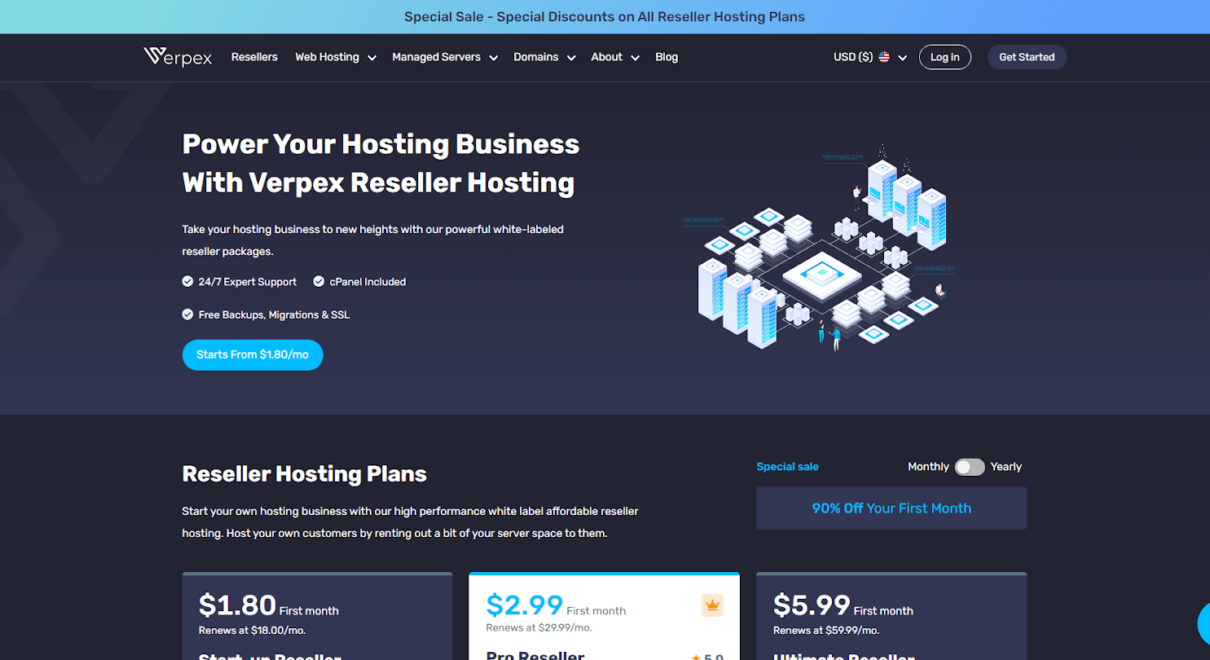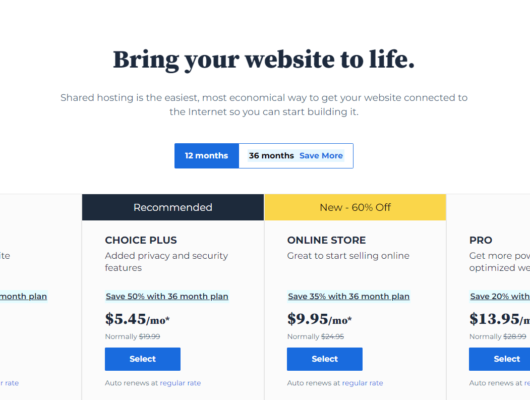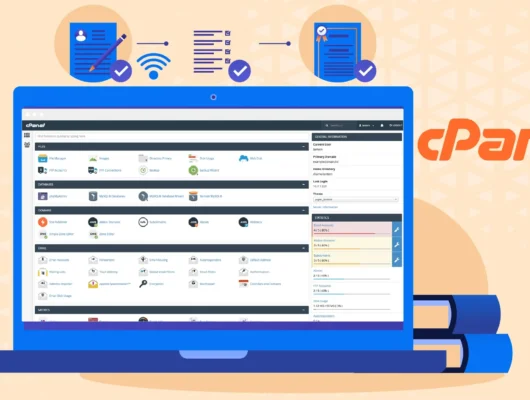Choosing the right reseller hosting is essential for building a successful hosting business.
In this guide, we’ll walk you through how to choose the right reseller hosting by exploring key factors like performance, scalability, customer support, and pricing.
With the right hosting provider, you can offer a seamless experience to your clients while growing your business with ease.
1. Understand What Reseller Hosting Is
Before diving into choosing the best hosting, let’s briefly review what reseller hosting is.
Reseller hosting allows individuals or businesses to purchase hosting resources (disk space, bandwidth, etc.)
in bulk from a web hosting provider and then resell them to their own clients.
As a reseller, you have control over pricing, client management, and customization options.
You’ll often use a control panel like cPanel or WHM (WebHost Manager) to manage multiple hosting accounts for clients.
2. Evaluate the Resources You Need
The first step in choosing the right reseller hosting plan is to evaluate how much server resource you’ll need.
Depending on the size of your business, the number of clients you plan to support, and the type of websites your clients will host, you’ll need a hosting plan that can handle your requirements.
Here are some key resources to consider:
- Disk Space: How much storage will you need to host client websites, emails, databases, and backups?
- Bandwidth: How much data will your customers transfer each month? The higher the traffic on your clients’ websites, the more bandwidth you’ll need.
- CPU and RAM: These resources affect the speed and performance of the websites hosted on your server. If you’re planning on hosting resource-intensive websites (e.g., eCommerce sites), you’ll need more CPU power and RAM.
3. Consider the Control Panel Options (cPanel/WHM)
The control panel is the interface you and your clients will use to manage websites, emails, databases, and more.
When choosing a reseller hosting plan, ensure that it provides a user-friendly control panel that suits your needs.
Most reseller hosting plans come with cPanel and WHM, which offer a great balance of features and usability.
WHM is used for managing reseller accounts, while cPanel is typically used by individual clients to manage their websites.
These tools are essential for resellers as they allow easy management of multiple accounts and resources.
Ensure that the hosting provider supports branded cPanel accounts, as this allows you to offer a white-label experience, which means your clients won’t know that you’re using a third-party hosting provider.
4. Look for Scalability
Your reseller hosting needs will evolve over time as your business grows.
Look for a hosting provider that offers scalable plans to meet future needs.
You should be able to easily upgrade your resources (disk space, bandwidth, CPU, RAM) without causing downtime for your clients.
Scalability is essential for a growing business, and some reseller hosting providers allow you to upgrade your plans without migrating data, ensuring a smooth transition.
5. Performance and Reliability
Website performance and uptime are critical for your business reputation and your clients’ success.
When choosing a reseller hosting provider, make sure that they offer high uptime guarantees (ideally 99.9% or higher) and reliable server performance.
To assess the performance of potential hosting providers, look for:
- Load times: Fast loading speeds improve user experience and SEO rankings. Choose a provider with high-performance SSD storage and optimized servers.
- Uptime Guarantee: Hosting providers that offer at least a 99.9% uptime guarantee show a commitment to reliability. This translates to more satisfied clients.
- Server Locations: Choose a provider with data centers located in regions that are close to your target customers to improve loading times and reduce latency.
6. Customer Support
Support is one of the most important factors when choosing reseller hosting. As a reseller, you’ll need reliable and fast customer support, both for yourself and for your clients.
Look for a hosting provider that offers:
- 24/7 support: Issues can arise at any time, so make sure support is available round-the-clock via multiple channels (phone, live chat, ticketing system).
- Technical expertise: Your provider should have a knowledgeable technical team that can help resolve any server-side or technical issues.
- Reseller-specific support: Some hosting providers offer reseller-specific support, which can be invaluable when dealing with client-related issues.
Having strong support means you can provide the best customer service to your clients, which is critical for retention.
7. Pricing and Profit Margins
Pricing is a key factor when choosing a reseller hosting provider.
You’ll want to choose a plan that fits your budget while still leaving room for profit margins.
Compare the pricing of several hosting providers and make sure you’re getting value for your investment.
When evaluating prices, also consider the following:
- Setup Fees: Some hosting providers charge a one-time setup fee. Check if this cost fits within your budget.
- Renewal Rates: Many hosting providers offer discounted rates for the first term, but these rates often increase when it’s time to renew. Make sure you’re aware of any future price hikes.
- Add-on Costs: Some services (SSL certificates, backups, etc.) may come with additional costs. Factor these in when determining your total expenses.
Choose a provider that offers transparent pricing, and ensure that you can set your own pricing structure for your clients.
8. White-Labeling and Branding
If you’re serious about establishing your own web hosting business, white-label hosting is a must.
Look for a hosting provider that allows you to rebrand the control panel (cPanel/WHM) with your own logo and custom domain.
White-labeling allows you to present your hosting services as your own, ensuring your customers associate your brand with high-quality hosting.
Some reseller hosting providers even allow you to customize the client portal, making it easier to provide a seamless brand experience for your clients.
9. Security Features
Security is a major concern for both you and your clients. Look for a hosting provider that offers strong security measures to protect your clients’ websites and data. Some essential security features to consider include:
- SSL Certificates: Offer SSL certificates to your clients for securing data exchanges.
- DDoS Protection: Protect your clients from distributed denial-of-service attacks.
- Malware Scanning: Ensure the hosting provider offers malware scanning and removal tools to protect websites from viruses and malicious threats.
- Firewall: A firewall helps protect servers from unauthorized access and potential attacks.
Security is crucial not only for your clients’ data but also for your business reputation.
10. Reputation and Reviews
Finally, always check the reputation and reviews of the hosting provider you’re considering.
Look for feedback from other resellers to gauge their satisfaction with the service.
You can find reviews on third-party websites, forums, and social media.
A provider with a solid reputation is more likely to offer reliable services and good customer support, ensuring your business runs smoothly.
Read more about Reseller Hosting with cPanel…
Conclusion
Choosing the right reseller hosting plan is crucial to the success of your web hosting business.
By considering factors like resource requirements, control panels, scalability, support, pricing, security, and reputation, you can select a hosting provider that supports your business goals and provides a seamless experience for your clients.
With the right plan in place, you can scale your business, provide top-notch hosting services, and grow your brand while maximizing profitability.






